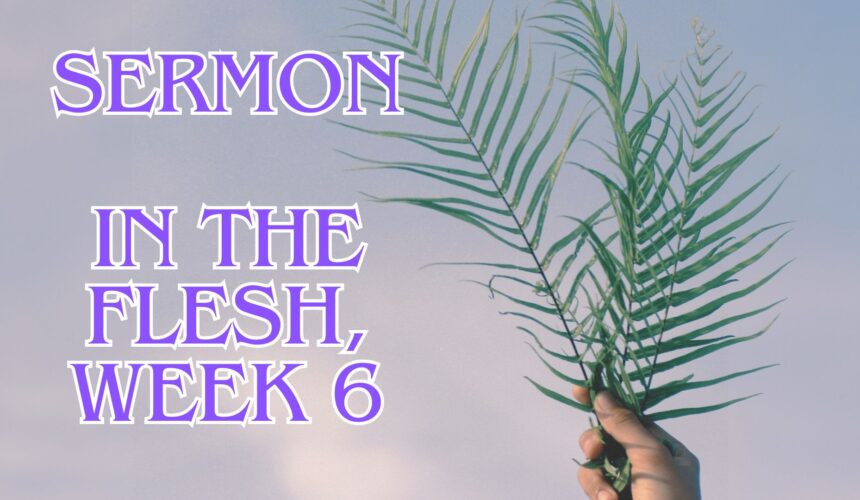Palm Sunday
April 13, 2025
Luke 19:28 – 40
It’s pretty much always a good idea to ask ourselves how we can eliminate distractions from God. In fact, that’s part of what Lent, this season of the church year we completing this week, is about: taking an inventory of the behaviors and states of heart and mind that stand in the way of deeper relationship with God. But at the same time, maybe we should also ask ourselves how we encounter God in our ordinary and often distracting surroundings, the everyday places where Jesus spent most of his time. Because one way of reading the Gospel message is to say that our common lives are holy. In the midst of every day, we can meet the God who fully embraces our incomplete, imperfect, distractible, yet somehow beautiful humanity, and who in that embrace makes us part of the story that God is telling.
So during Lent this year, I’ve focused my sermons on where and how we encounter God in this world that seems almost designed and engineered and purpose built to distract us from God. I’ve looked at how we find God in the communities we create. I’ve talked about repentance as reframing our perception so that we see the world differently, and allowing that new perception to guide us into acting differently. I’ve talked about encountering God in the places and people we find it easy to ignore and disregard, and how we can find God in those things that normally we might consider distractions from God: the fig tree that stubbornly refuses to produce or the baby crying to be held and comforted. Last week I talked about encountering God in acts of kindness, whether big and extravagant or small and quiet.
So today is Palm Sunday. Every year on this day we hear the story of Jesus’ triumphant entry into Jerusalem, celebrated by cheering crowds who welcome him as their King. Often, people read this story as an indictment of the fickle mob, the way the people cheering for Jesus will be the same ones calling for his blood a week later. And if we understand the story that way, we can ask ourselves: how are we like those crowds? Are we committed enough to our ideals to hold onto them when the winds change and things get scary? I think that’s a worthwhile question to ask, but I don’t think it’s the only way to understand the Palm Sunday story. The Gospels say that people cheer Jesus as he enters Jerusalem, and people call for his execution after he’s arrested. But as far as I know, there’s nothing that says those are the same people. Maybe they’re two different groups, one welcoming him and one threatened by him. I wonder if there’s more to this story that might be helpful to us.
Today we heard Luke’s version of Palm Sunday. People in Jerusalem are preparing to celebrate Passover. Jews from all over the known world have traveled there for this key holiday in their tradition that recalls God delivering them from a tyrant King. So it’s a politically charged holiday, especially in the first century when the holy city was occupied by the Roman military. Historians of this period believe that Pontius Pilate, the Roman governor, responded to the political tension and the possibility of an insurrection by staging a military procession through the streets. Pilate rides in front of his troops in full armor, mounted on a war horse. He’s followed by legions of foot soldiers and mounted troops and charioteers, all wearing armor, all bearing weapons. Today we would call this a show of force, like sending naval vessels off the coast of Taiwan when things get a little tense. Pilate’s message is clear: any hint of rebellion will be swiftly and brutally put down.
And into that tense moment rides Jesus. It’s clear he is mounting a protest, trying to be provocative. He knows exactly what he is doing. Centuries before, the prophet Zechariah had written of a humble King who would stand on the Mount of Olives and ride into Jerusalem, not on a war horse like Pilate, but on a donkey’s colt. So Jesus chooses to enter Jerusalem from the Mount of Olives, riding a donkey’s colt. Everything about his entry is calculated to antagonize Pilate and those who backed his power. Unlike Pilate, Jesus has no army; he has a collection of peasants, laborers, tax collectors, people thought to be unclean and disreputable. Instead of displaying his power, marching through the streets to a palace as Pilate did, Jesus weeps, tears of sorrow flowing down his face for the fate of Jerusalem.
Yet Luke’s version of the story says people line the streets, throwing down their cloaks to welcome him. They shout a phrase from the Jewish scripture, Psalm 118. But instead of saying, “blessed is the one who comes in the name of the Lord,” as Psalm 118 does, they say, “Blessed is the King who comes in the name of the Lord.” Calling Jesus a King is a very dangerous thing to do. To say Jesus is King means that Caesar isn’t, or shouldn’t be. To show up, as so many in Jerusalem do, in support of this peasant King, is to take your life in your hands.
It seems to me that Jesus is drawing an intentional contrast between two different kinds of power. Pilate offers the power of violence and terror, power enforced by threat and weapons. Jesus represents the power of hope and freedom from tyranny, the power of the loving, often invisible action of God.
I think that somehow, at least for that moment, despite all evidence that Jesus is overmatched, the people gathered in Jerusalem have caught that vision. They cheer for Jesus because they are willing to hope that they will be delivered from the tyranny of Rome by an upstart peasant rabbi riding a donkey. They welcome a King who challenges not just the authority of Herod and Pilate and the Emperor, but the kind of authority those rulers represent.
Now, we can ask what good hopeful actions like that do, because there’s a certain amount of evidence they don’t do much. We know the story: only a week later, it looked like the Jesus movement was destroyed, their leader publicly humiliated and executed, his followers scattered and hiding. We know that story and lots of stories like it because we’ve seen them. In our own day we’ve seen backsliding in human rights and democracies all over the world; we see a rise in hate crimes and the scapegoating of vulnerable groups. So it’s a legitimate question: what does hope do when there is no evidence that it does anything, when it seems like there is no reason to hope?
You may have heard of a South Korean politician and activist named Ji Seong-Ho. Ji is a representative elected to the National Assembly. He was born in North Korea in 1982, not far from one of that country’s concentration camps where people who are labeled dissenters or enemies of the state are sent and usually never heard from again.
Most of North Korea is vulnerable to hunger most of the time, but in Ji’s teenage years the famine was especially bad. In interviews he’s given, he recalls having no cooking oil or meat, ever. The family often ground up dry corn husks and ate them. Sometimes they would eat mountain grass and pieces of seaweed if they could get it; they would dig up seeds that rats had collected and stored in their burrows and eat those. When they could, they killed the rats and ate them – but that was rare; Ji has called those nights “a feast.”
Sometimes, they would sneak onto passing rail cars and steal a few lumps of coal to trade it in local markets for food. One day in 1996, Ji was on one of those coal trains. He was so hungry he passed out and fell onto the tracks between two train cars. When he woke up, the wheels had run over him and taken off one of his legs and his hand. After a horrible surgery, Ji spent ten months recovering at home, with his father caring for him and nursing him back to health through infections and setbacks and continued starvation.
Eventually, he was able to walk with crutches. One day, walking through the mountains looking for something to eat, he crossed the Chinese border. When he came back, North Korean guards arrested him, beat him, and took away his crutches before letting him go: they said they were punishing him because he had dishonored his country by showing China that there were disabled people living in North Korea.
In 2006, ten years after he lost his leg and hand, he and his brother escaped from North Korea by swimming a river – one of the rare cases of a person with a physical disability successfully evading the soldiers looking for them. They got into China, and Ji told his brother to go on without him because he was too slow and would be easy to capture. But people helped him, and eventually he was able to reunite with his brother in South Korea. He soon got word that his father had also tried to escape but was caught and killed. His mother and sister disappeared without a trace and were never heard from again.
Today, in addition to being a member of South Korea’s governing assembly, Ji is an attorney and a human rights activist, working relentlessly to help other escapees and to draw attention to North Korea’s human rights violations and its mistreatment of people with disabilities. He’s become a committed Christian who believes the North Korean dictatorship will fall in its next generation, and that in his lifetime he will see the Korean peninsula unified.
Now we might feel all kinds of ways about that story. I know I do. Maybe we’re inspired by Ji’s courage, or outraged at the incredible cruelty of the North Korean regime, or sad for the losses and suffering of so many who are still living under it. But for me, what really stands out is Ji’s capacity for hope: hope that he and others could escape; hope that things could be better – even when there might seem to be no rational reason for hope.
No one could have blamed Ji if he had just given up. His life from childhood was one misery after another. He watched his grandmother die of starvation; he lost limbs, contracted infections, nearly died multiple times in his recovery; he was on the verge of starving to death almost daily. If anyone ever had a reason to feel hopeless and powerless, it was him. But somehow, Ji decided to defy his totalitarian government. He decided to try to escape, at great risk to himself and his family, and then to dedicate the rest of his life to destroying tyranny and oppression. He chose to hope.
What good does hope do when there is no evidence that there is reason to hope?
Well, what good has Ji Seong-Ho done, with his work helping others and his advocacy for human rights? What good have all those faithful people done, some whose names we know and others we never will, who followed Christ and stood for compassion and justice and peace, even though there was no evidence that their choice would bring about any positive change?
I think that hope is a decision. And I think as Christians, it is a decision we are called to make, much like those brave and faithful people in Jerusalem nearly 2000 years ago – who took to the streets in support of a humble King and a compassionate power that didn’t seem to have any realistic chance of changing anything. Faith in God is hope in God’s power, and I believe the decision to hope itself creates hope. I think that we are called to be the hopeful people who help make hopeful behavior possible, knowing that no matter how things may look, God is at work.


